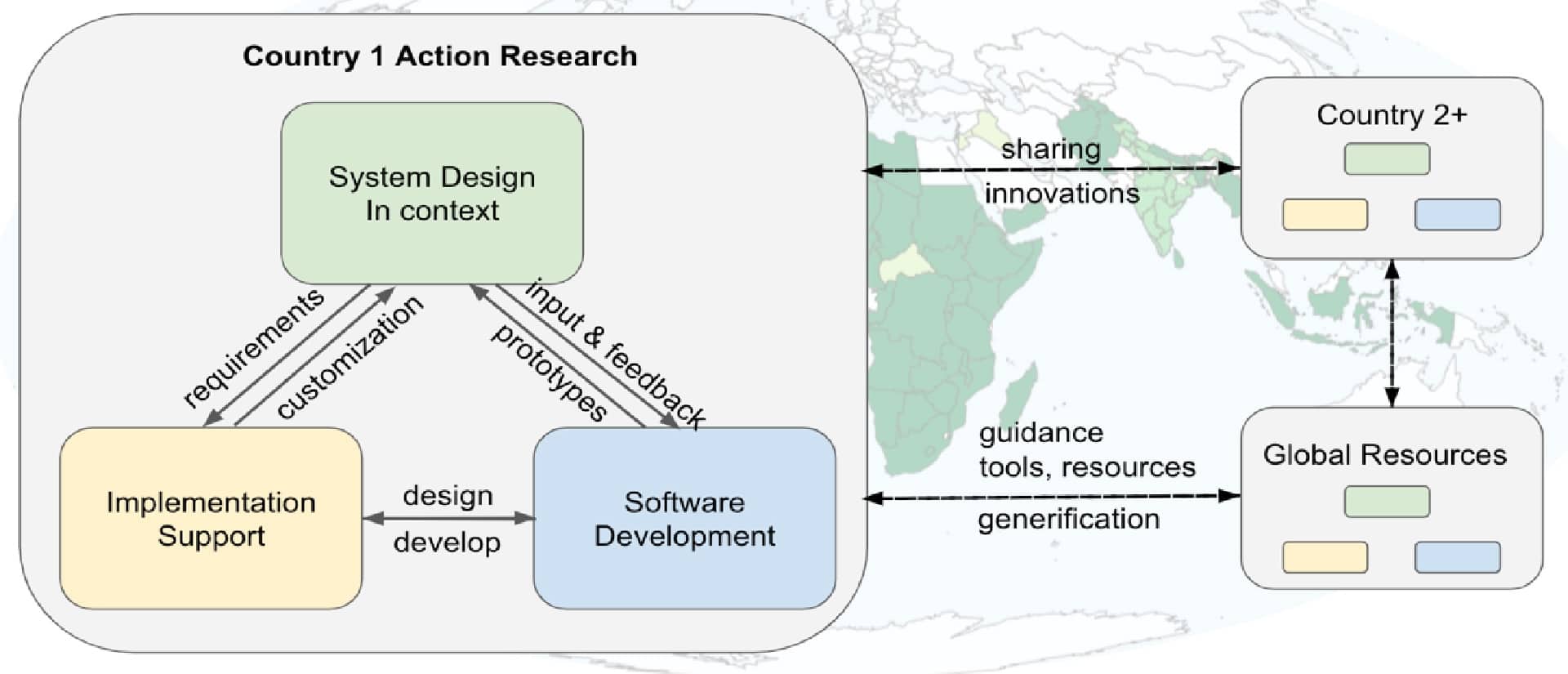The HISP Approach
The HISP network has 30+ years of experience providing localized support to design, implement, maintain & adapt innovative and sustainable locally owned information systems – at a global scale.
Jump to a section on this page
The HISP approach to sustainable, locally owned information systems
The DHIS2 for Education project is coordinated by the HISP Centre at the University of Oslo (UiO) in partnership with a network of local HISP groups in the global south, and is guided by an approach to information system design and implementation that supports sustainable, locally-owned systems. The HISP approach consists of three interrelated and mutually reinforcing activities: participatory design through action research with local stakeholders; software development of generic open-source tools; and long-term, local implementation support and capacity strengthening. These activities are carried out in collaboration with local partners and with a high degree of focus on good governance and building trust.
This approach has been fundamental to HISP since our beginnings in 1994 in post-Apartheid South Africa as a joint project between the University of Oslo and the University of the Western Cape, and has been described as the success formula for the worldwide adoption of DHIS2 and the long-term sustainability of DHIS2 systems and implementations. The HISP approach helps ensure that the software platform we design meets the needs of local users, and supports the development and sharing of local innovations around the world.
Read more about the HISP network and HISP UiO in the following sections, and visit these pages to see how we have put the HISP approach into practice in the DHIS2 for Education project:

HISP groups: On-the-ground support for local systems and a global network for sharing solutions
The HISP network is a global collaborative association made up of 23 local HISP groups (and counting!), which are local legal entities based in-country in Africa, Asia, the Middle East, and the Americas, plus the HISP Centre at the University of Oslo (HISP UiO). We engage in long-term partnerships with government ministries and other local stakeholders in more than 80 countries to support sustainable, locally-owned information systems. Our core areas of work include designing, developing, and maintaining the DHIS2 software platform and related tools and resources, and providing implementation support, local customization and configuration, custom app development, and in-country and regional capacity building for digitalization projects in LMICs.
Our work is guided by shared values and principles that emphasize collaboration, sharing, local ownership and input, and long-term commitment to our partners and mission of supporting digitalization and information system strengthening in support of the Sustainable Development Goals.
The HISP network has a three-tiered organizational structure to facilitate our work on projects and contracts from the local to the global level:
- National & subnational: HISP groups support projects that are based in individual countries, including the country where the group is based and countries in their region and language community.
- Regional & continental: HISP hubs in Africa and Asia coordinate multi-country, regional, and continental projects, subcontracting with HISP groups across the region to draw on their resources and expertise.
- Global: HISP UiO, as the coordinating body for the global HISP network, leads work on global initiatives, including development of DHIS2 software features and supporting resources, and in-country implementation projects through subcontracts with HISP hubs and HISP groups.
Learn more about how HISP provides implementation support for DHIS2 for Education projects, and explore an interactive map of the HISP network.

HISP UiO: Leading DHIS2 development & coordinating the HISP network
The HISP Centre at the University of Oslo (HISP UiO) is a non-profit, interdisciplinary center within UiO’s Department of Informatics that promotes research, innovation and capacity strengthening on information systems and digitalization for health, education, and other sectors and programs that support the Sustainable Development Goals. Through our work, we help LMICs to design, deploy, and sustain digital tools for improved public sector governance through decentralized data collection and use. HISP UiO leads the DHIS2 for Education project.
HISP UiO activities include:
- Engaging in partnerships with international and bilateral organizations to ensure the long-term sustainability of DHIS2 as a Digital Public Good.
- Supporting the global HISP network as a coordinating body and equal partner to the HISP groups.
- Developing and maintaining the DHIS2 software platform, and related global resources and tools that can be freely adapted to support local implementations and innovations.
- Managing contracts for global and multi-region projects – including subcontracting HISP hubs and HISP groups for country-level work – and coordinating DHIS2 initiatives for new sectors and emerging use cases.
- Collaborating with partner organizations to ensure that DHIS2 supports – and helps disseminate – global standards, and to facilitate interoperability.
- Coordinating the DHIS2 Academy curriculum, developing training materials and resources, organizing and facilitating advanced Academy trainings, and managing the DHIS2 Online Academy.
- Coordinating the DHIS2 Community of Practice discussion forum, and producing and disseminating informational materials about DHIS2 and HISP.
HISP UiO began in 1994 as the Health Information Systems Programme, a PhD research collaboration between UiO in Norway and the University of the Western Cape in post-apartheid South Africa. HISP UiO has grown over time to meet growing DHIS2 demand in LMICs – with the support of our financial partners – into a diverse organization with employees based both in Norway and in countries around the world. Learn more about HISP UiO.